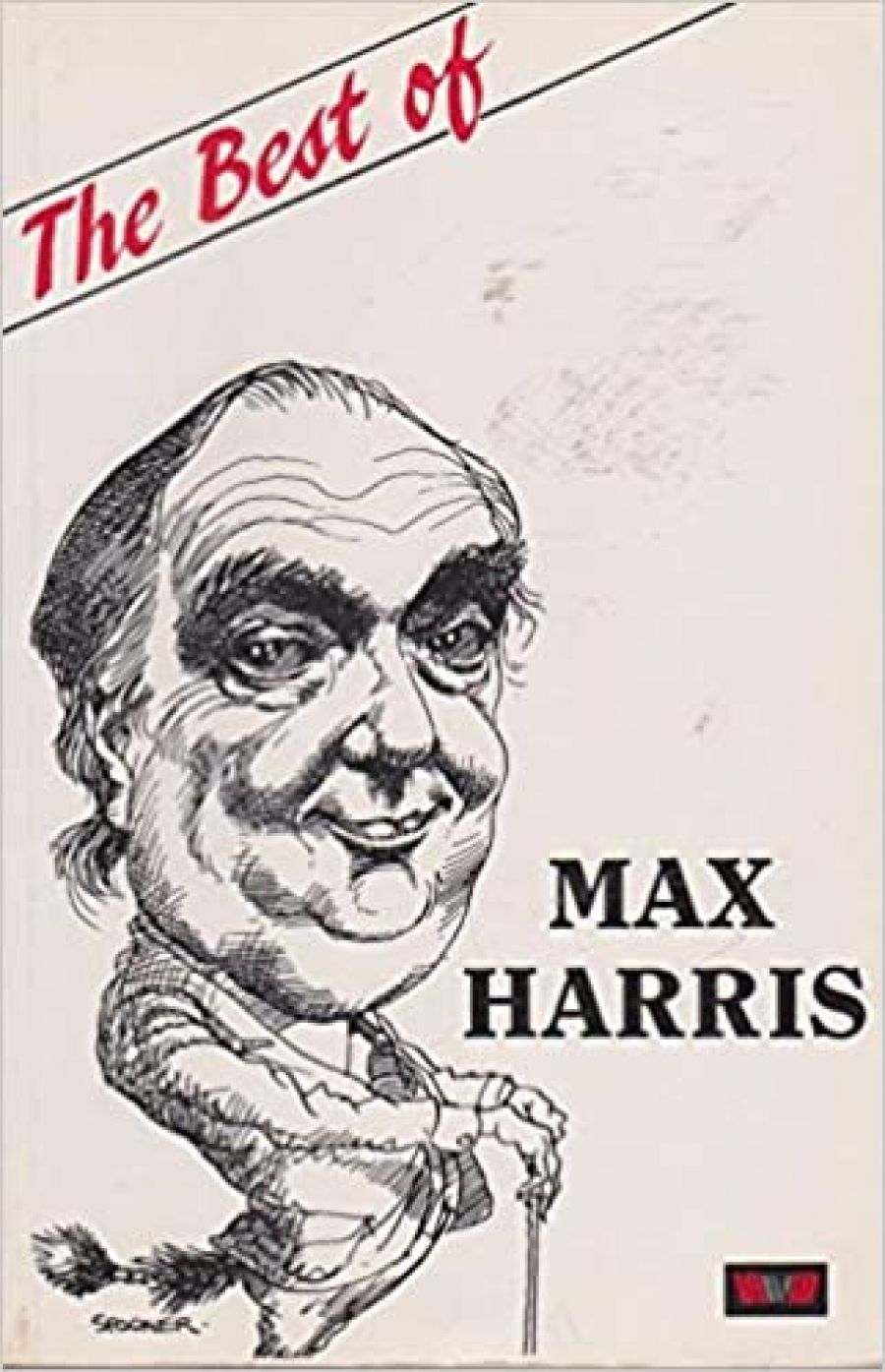
- Free Article: No
- Contents Category: Selected Writing
- Review Article: Yes
- Online Only: No
- Custom Highlight Text:
Max Harris must be an important cultural figure. Max Harris keeps saying he is. He also notes that Rupert Murdoch thinks he is. Now Harris has published just over two hundred pages of ‘The Best of Max Harris’, subtitled ‘21 Years of Browsing’, thirty six pieces from the Australian. I pass over in almost-silence the implication that Max is only at his best when writing for Rupert. And maybe the best one can say is that they deserve each other and wish them a happy anniversary.
- Book 1 Title: The Best of Max Harris
- Book 1 Subtitle: 21 years of browsing
- Book 1 Biblio: Unwin Paperbacks, 209 pp., $8.95 pb
In today’s Australian (February 8), Phillip Adams proves that ‘Our Minds Make Morons of Computers’. Harris browses through ‘My Friend Phillip the insecure’. The Harris piece indulges in a clever psychobiography (one of Max’s favourite words) of Adams. Entertaining, intelligent, and enjoyable as this column is, I will cheerfully lay it out on the back lawn tomorrow and cover it with Snappy Tom for the cats. In this book, Harris refers to his ‘fugitive opinion-writing’, and to ‘my modest pieces’. In his latest column he asserts:
Underneath it all I know for my part (and Adams probably knows against the grain and never to be admitted) that one day on the life of Mother Mary MacKillop was worth all the days of the lives of Adams or Harris.
This is one of the Harris statements that keep jerking up and making you think that Harris is really worth thinking about. But not for long. In this book he has a ‘modest piece’ on Mary MacKillop, which pays undue reverence to two piously reverential biographies. The Harris modesty is unconvincing. I have written a monthly column for three years, and my next resignation will be final. So I admire intensely anyone who can produce a weekly column for twenty one years. But Harris does not accept his own logic. Each ‘modest piece’ of ‘fugitive opinion-writing’ is one that ought to have been allowed to get-away. There is little wonder left in the encounter with thirty six pieces of dated journalism. Phillip Adams is obsessed with the absent God of Christianity and the present God, Himself. Max Harris is obsessed with Phillip Adams and the ageing Angry Penguin, Himself. The pieces are totally immodest, self-obsessed, and ephemeral. This is highlighted by that in a book purporting to cover twenty one years, the oldest piece comes from 1976.
In 1978, Harris is welcoming David Tonkin (who?) to power, and rejoicing that the bad old days of Dunstan and Labor are over. In 1980 small business is taking over the world, defeating ‘the giant department store’. ‘Instead we have a world-wide explosion of the small boutique system.’ I have no doubt that Harris shops in boutiques. He also thinks that nobody has ever noticed that most taxi drivers are not Anglo-Saxon. Harris is a man out of touch with everything except his own glorified past. His claim to be ‘fairly representative of the common citizen of the Western world’ is obviously absurd.
Harris writes entertainingly on camels. Also on restaurants if you don’t mind names being pelted at you rather than being merely dropped. This is Harris’ level and he is good when he sits there. When he proves that there is no such thing as a ‘sacred’ aboriginal site, he is perversely ill-informed. In 1981, Harris announces that it was he who broke the story that mateship is about homosexuality. ‘What a joke,’ he laughs about poor old Lawson and declares, ‘Australia, if it has a literary tradition, has an overwhelmingly feminine, if not feminist literature’. In 1981, he also writes reverently of ‘the great bush tradition’ as found in Gordon and Lawson. Harris blesses feminism and patronises women. His still centre is his own past. His wit consists of polysyllabic and pompous larrikinism, the ancient schoolboy using big words. He parades his learning about Ann Rand, Ian Idriess, and in three lines about Inky Stephenson, the Fanfrolica Press and Fred Nietsche (for all, sic!). As a lousy proofreader, I have a passionate sympathy for bad proofreading. But to quote Max, I think he should feel a ‘de post hoc facto sense of shame’ about getting the names of his heroes and villains wrong. The learning seems spurious and patronising. To go Latin as Max loves to do, he is a laudator temporis acti. To translate, as Max never deigns to do, he is a whinger about the present. Harris pre-empts criticism by stating that ‘I do not expect this collection to be received with any critical generosity of spirit’. Appropriately, for the collection lacks any generosity of spirit, except towards Max Harris. The young in particular are not ‘approbated’. So one is left with wondering whether to approbate the anciently young Angry Penguin contemplating his navel.
The Best of Max Harris is an important book because it proves scientifically that Penguins (Angry) have navels that demand at least twenty-one years of contemplation.


Comments powered by CComment